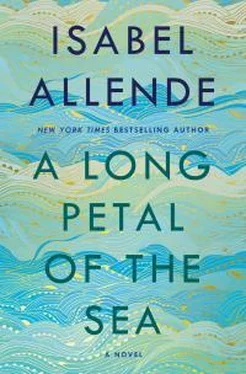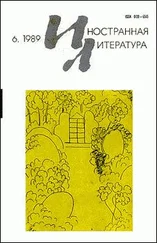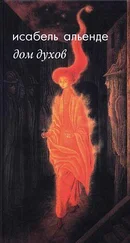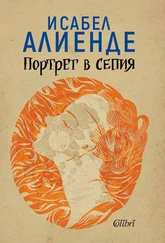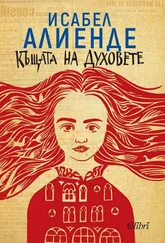—
A YEAR EARLIER, INGRID Schnake had received a letter from a stranger claiming to be her mother. It didn’t come as a complete surprise, as she had always felt different from the rest of her family. First she confronted her adoptive parents, who eventually admitted the truth. Then she prepared to receive the visit of Ofelia and Felipe del Solar, who arrived accompanied by a little old woman wearing deep mourning: Juana Nancucheo. None of them had the slightest doubt Ingrid was Ofelia’s long-lost daughter: the resemblance was only too obvious. Since then, Ofelia had seen her daughter on three occasions. Ingrid treated her with the stilted courtesy of a distant relation, because her real mother was Helga Schnake. This visitor with paint-stained hands and the bad habit of constantly complaining was a stranger to her. Aware of the similarity in their appearance, Ingrid was worried she might also have inherited her mother’s defects, and that as she grew older she would become as narcissistic as Ofelia was. She learned the story of her birth little by little, and it was only at their third meeting that she discovered her father’s name.
Ofelia considered her past dead and buried, and avoided talking about it. She had obeyed Father Urbina’s instruction to stay silent, and she so resolutely refused to mention the dead boy buried in the rural cemetery that this youthful episode became lost in the fog of reiterated omission. She recalled it briefly when she had to bury her husband and wanted to keep the promise they made when they married that one day the baby boy would be laid to rest with them in Santiago’s Catholic cemetery. This would have been the moment to transfer the baby’s remains, but her brother Felipe persuaded her not to do so, as she would have had to explain it to her children and the rest of the family.
By the time Laura del Solar’s health began to decline, Ofelia had been living alone for years, painting in her studio in the Chilean countryside. Her elder son was building a dam in Brazil, while her daughter was working in a museum in Buenos Aires. Doña Laura, who was about to turn a hundred, had for a long time been suffering from dementia. Two selfless caretakers looked after her day and night, under the strict supervision of Juana Nancucheo, almost as old as Laura but looking fifteen years younger. She had served the family forever and intended to continue to do so for as long as Doña Laura needed her. It was her duty to look after her until her dying breath. Her mistress was confined to bed, lying there on feather pillows and embroidered linen sheets in her silk nightdresses imported from France, surrounded by the precious objects her husband had bought her with no regard for cost. After his death, Doña Laura freed herself from the iron straitjacket of her marriage to such an overbearing man. She was able to do exactly as she pleased for a while, until old age crippled her and senility prevented her from communicating with the ghost of Leonardo, her Baby, in spiritualist séances. She gradually lost her mind, couldn’t figure out where she was in the house, and when she saw herself in the mirror asked with alarm who the ugly old woman in her bathroom was, and why she came every day to pester her. Soon, the arthritis in her legs and feet meant they couldn’t support her, and she was unable to stand up. Enclosed in her bedroom, she alternated between weeping and prolonged drowsy spells, calling out to Baby with an inexplicable anxiety and terror that her doctor tried in vain to lessen with antidepressants. During those final days of her illness, her whole family thought she was suffering from the loss of Leonardo as if it had only just happened.
Felipe del Solar, the head of the clan since his father’s death, had flown in from London to take charge of things, settle debts, and distribute the family’s possessions. People said he must have made a pact with the devil, because, contrary to his own hypochondriac predictions, he seemed never to age. He had a thousand things wrong with him, and every week discovered a new one. Everything hurt, even his hair, but thanks to one of life’s injustices, none of this was visible. He was a distinguished gentleman straight out of an English comedy, wearing a vest, a bow tie, and a supercilious expression. He put his healthy appearance down to London fog, Scotch whisky, and his Dutch pipe tobacco. He brought with him the documents for the sale of the Calle Mar del Plata house; the land it was built on in the heart of the capital was worth a fortune. He only had to wait for his mother to die to finalize the deal.
Reduced to little more than skin and bone, Doña Laura went on calling out to her Baby until her dying breath, unable to find peace either in her medicines or her prayers. Juana Nancucheo closed Laura’s mouth and eyes, said a Hail Mary, and dragged herself wearily away. At nine the next morning, while the funeral directors were preparing the house for the wake, the coffin in the living room festooned with floral wreaths, candles, black cloths and ribbons, Felipe gathered his sisters and brothers-in-law in the library to inform them of the forthcoming sale of the house. Afterward he called in Juana to tell her the same.
“They’re going to knock down the house to build an apartment block, Juana. But you won’t go short of anything. Tell me how and where you’d like to live.”
“What can I say, niño Felipe? I don’t have any family, friends, or acquaintances. I can see I get in the way. You’re going to put me into a home, aren’t you?”
“Some old people’s homes are very good, Juana, but I won’t do anything you don’t want. Would you like to live with Ofelia or any of my other sisters?”
“I’m going to die in a year, and I don’t care where. Dying is dying, that’s all there is to it. You finally get some rest.”
“My poor mother didn’t think that…”
“Doña Laura felt very guilty, that’s why she was afraid to die.”
“For goodness’ sake, what did my mother have to feel guilty about, Juana?”
“That’s why she cried so much.”
“She had dementia and was obsessed with Leonardo,” Felipe said.
“With Leonardo?”
“Yes, Baby.”
“No, niño Felipe, she didn’t even remember him. She was crying over little Ofelia’s baby.”
“I don’t understand, Juana.”
“Do you remember she became pregnant before she was married? The thing is, that baby didn’t die, as everyone said.”
“But I’ve seen his grave!”
“It’s empty. And it was a girl. She was taken away by that woman—I can’t recall her name—the midwife. Doña Laura told me all this, and that’s why she was weeping, because she listened to Father Urbina and stole little Ofelia’s daughter from her. She spent her whole life with that lie gnawing away inside her.”
Felipe was tempted to put this macabre story down to his mother’s dementia, or even Juana’s senile ideas, and dismiss it as absurd. He also thought that even if the tale were true it would be best to ignore it, because it would be unnecessarily cruel to tell Ofelia. However, Juana insisted she had promised Doña Laura she would find the child so that Laura could go to heaven rather than be trapped in purgatory, and promises to the dying were sacred. At this, Felipe realized there was no way to keep Juana quiet. He would have to deal with the matter before Ofelia and the rest of the family came to hear of it. So he promised Juana he would look into it and keep her informed.
“Let’s start with the priest, niño Felipe. I’ll go with you.” He couldn’t shake her off. The complicity built up between them over eighty years and his certainty that she could read his intentions forced him to take action.
By now, Father Urbina had retired. He was living in a residence for old priests, looked after by nuns. It was a simple matter to find him and arrange an interview: he was lucid and remembered his former flock very well, especially the del Solar family. He greeted Felipe and Juana with an apology for not having been able to give Doña Laura extreme unction himself. He had undergone an intestinal operation, and the recovery was taking far too long. Getting straight to the point, Felipe repeated what Juana had told him. As an experienced lawyer, he had been prepared for a difficult cross-examination to corner the bishop and force him to confess, but this proved completely unnecessary.
Читать дальше
